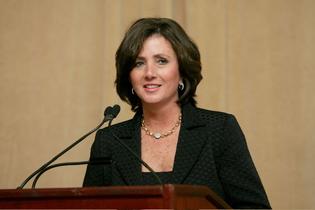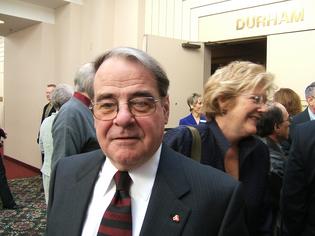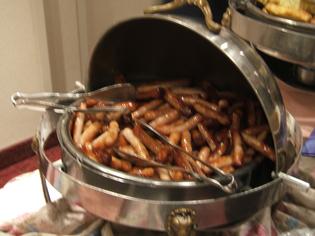 This judge blasted the booty-grabbing bosses of NewAlliance Bank at their bouncer-ringed annual shareholders meeting Tuesday. He said the bank has among the greediest records in Connecticut on a benchmark of helping the needy.
This judge blasted the booty-grabbing bosses of NewAlliance Bank at their bouncer-ringed annual shareholders meeting Tuesday. He said the bank has among the greediest records in Connecticut on a benchmark of helping the needy.
The judge is 81 year-old Anthony DeMayo, who sits in the state Superior Courthouse a block from New Haven’s Green. He took the morning off from the bench to drive to Cromwell for NewAlliance’s annual meeting.
 The meeting was the one opportunity all year that shareholders have to question bank officials, who have come under criticism for grabbing tens of millions of dollars in stock options and other compensation this past year. Bank President Peyton Patterson (pictured) alone got stock options worth as much as $27 million, according to a Hartford Courant column calling the whole episode a “galling” and nearly unprecedented money-grab. Peyton came to New Haven in 2002 to take over the depositor-owned New Haven Savings Bank. Amid an outpouring of protest, and with the help of local corporate honchos on her board, Patterson turned mutually-owned New Haven Savings into a publicly-owned company called NewAlliance Bancshares Inc. and bought up three other banks. A hometown bank with open doors became a regional corporate powerhouse (now the third largest in Connecticut, sixth largest in New England) with tight security to guard against a hostile public. Critics accused Peyton and board members like Yale-New Haven Hospital’s Joe Zaccagnino of seeking to enrich themselves at the expense of a bank built up over a century with everyday depositors’ money.
The meeting was the one opportunity all year that shareholders have to question bank officials, who have come under criticism for grabbing tens of millions of dollars in stock options and other compensation this past year. Bank President Peyton Patterson (pictured) alone got stock options worth as much as $27 million, according to a Hartford Courant column calling the whole episode a “galling” and nearly unprecedented money-grab. Peyton came to New Haven in 2002 to take over the depositor-owned New Haven Savings Bank. Amid an outpouring of protest, and with the help of local corporate honchos on her board, Patterson turned mutually-owned New Haven Savings into a publicly-owned company called NewAlliance Bancshares Inc. and bought up three other banks. A hometown bank with open doors became a regional corporate powerhouse (now the third largest in Connecticut, sixth largest in New England) with tight security to guard against a hostile public. Critics accused Peyton and board members like Yale-New Haven Hospital’s Joe Zaccagnino of seeking to enrich themselves at the expense of a bank built up over a century with everyday depositors’ money.
Judge DeMayo took a seat Tuesday morning right by one of the public microphones in the center of the Grand Ballroom of Cromwell’s Crowne Plaza Hotel so he could fire off the first question to Patterson at the annual meeting.
His question had to do with a program called IOLTA, for “Interest on Lawyers’ Trust Accounts.” By law, banks turn over to the Connecticut Bar Foundation all interest earned on short-term accounts lawyers set up for, say, holding money in escrow for a real estate closing. The Bar Foundation distributes the money to legal services for the poor and for law school scholarships.
But banks get to choose what interest rate to offer on those accounts. Since Patterson took over the bank, it sank to the bottom of the pack of Connecticut banks in the amount of interest money it turns over. Two of the banks purchased by NewAlliance were paying up to 10 times as much money into IOLTA at the time Patterson took them over.
“Our bank — or your bank, if that is how you want to look at — is the worst performing bank in the state,” DeMayo chided Patterson, who stood at a lectern at the front of the hall. “I am not proud of that.”
He said the bank pays just 0.55 percent interest on lawyers’ trust accounts — far less not only than most other banks’ IOLTA payments, but even far less than the 1.5 to 2 percent interest NewAlliance pays on regular checking accounts. The bank paid just $216,575 in total to the fund last year, out of $10 million that goes statewide to help fund legal aid for the poor, DeMayo said.
DeMayo made reference to the bank’s glossy annual report emblazoned with the slogan “capital ideas/ human values.” He noted that it showed a full-page picture of a smiling young black girl to lead off its section entitled “values.”
“In view of the human values you portray,” DeMayo scoled, “and that wonderful picture of that child benefitting” from NewAlliance philanthropy, “how can you justify treating the IOLTA fund the way you do?”
Patterson didn’t flinch.
“We better look at that interest rate,” she responded. “I appreciate your comments.”
DeMayo persisted. He accused the bank of “indulg[ing]” in game-playing” by “hold[ing] on to the last nickel to the last minute.” While other banks wire their contributions to IOLTA, NewAlliance pays just once a quarter, by check, to gain an extra few cents on the float, he charged.
“That is not my idea of a classy operation, madam,” DeMayo concluded.
Asked about the matter after the meeting, a NewAlliance senior vice-president, Brian Arsenault, said he would have “get back” to a reporter with details. “It was a left-field question. I’ve got to check it out,” he said.
In fact, legal aid advocates have publicly urged Patterson to do better on IOLTA since before she completed the bank’s conversion from New Haven Savings to NewAlliance in 2004. (Read to the bottom half of this 2003 New Haven Advocate article for details.)
That $20-Plus Million
Patterson made it through the meeting with only one shareholder directly bringing up the huge payout she and the other bank directors gave themselves this year.
“Almost all of the value that’s being increased is going to you instead of us,” complained one shareholder in a question posed to Patterson. “There are 10 of you. There are 20,000 to 30,000 of us,” yet both groups have taken home about the same amount of money in aggregate in profits since the conversion, he claimed (dividends for shareholders, stock options and bonsues for Patterson and directors).
Now that “you have your incentive” for high performance, he asked, to applause from some of the 150 people in attendance, would Patterson and company promise to go easier on the stock options this coming year?
“We hear you,” Patterson “responded.” “We’re on the same page in respect to that. I do appreciate your feedback.”
The man asked the question again: Will you make any guarantees on limiting options this coming year?
 ““I’m personally not able to comment on that,” Patterson claimed, because, she said, that’s up to the bank’s compensation committee. That committee is headed by retired electric-company exec Richard Grossi (pictured).
““I’m personally not able to comment on that,” Patterson claimed, because, she said, that’s up to the bank’s compensation committee. That committee is headed by retired electric-company exec Richard Grossi (pictured).
In Play?
Another shareholder asked Patterson about plans ultimately to sell out the bank to an out-of-state megabank— and reap an even bigger personal cashout. Critics accused Patterson and the board of planning that all along when they took the bank public. At the time, they denied it. The official line was that the bank wouldn’t be sold for at least five years.
But at Tuesday’s meeting, Patterson refused to make such a commitment. The questioner, “longtime depositor” and shareholder William Cohen, said he had remembered bank officials promising New Haven’s mayor not to sell the bank for five years. “lately some people have been telling me that the five years only referred to a hostile failure, which makes no sense.” He asked Patterson about it.
Patterson referred to a state law prohibiting hostile takeovers of newly public banks for the first five years. But banks like NewAlliance “can after three years partner with a friendly institution,” she said.
Cohen persisted: Didn’t the bank promise not to do that as part of a compromise deal brokered by the mayor?
“No, there was no special arrangement,” Patterson said.
French Toast & Sausages
 After an hour, it was over. NewAlliance treated its shareholders to a buffet of eggs, bacon, sausages (pictured), and French toast. The shareholders ate their brunch in hotel’s “Fife” room.
After an hour, it was over. NewAlliance treated its shareholders to a buffet of eggs, bacon, sausages (pictured), and French toast. The shareholders ate their brunch in hotel’s “Fife” room.
Patterson, Zaccagnino and the rest of the board, meanwhile, scurried to a private meal of their own instead of mingling with and answering any more questions from their shareholders. They ate their private meal in the “Durham Room,” where they’d also barricaded themselves prior to the meeting, guarded at all times by a retinue of stocky bouncers who spent the meeting stationed throughout the room and the hallways preventing any unwanted human contact. It appeared that while it may be possible to steal $20 million and get away with it, there’s still a price to be paid in the currency of personal freedom.



Perhaps an all-cake buffet might have been more appropriate.